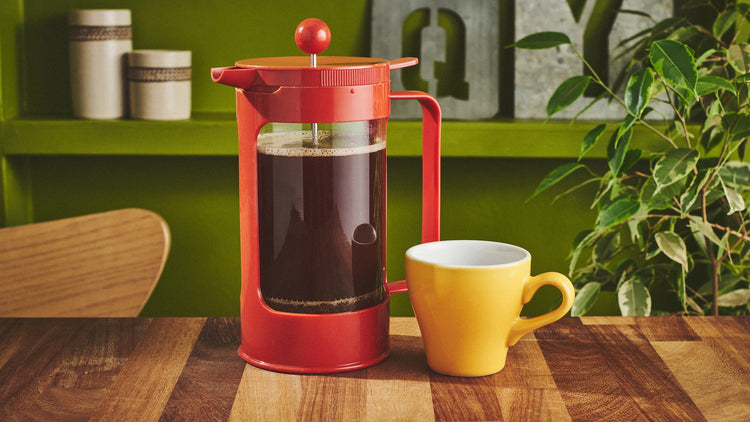What is a french press?

The perfect coffee maker for hosting... or if you can drink a lot of coffee
What is it?
You may have been served coffee in one of these at a hotel, or if you've ever had the pleasure of going somewhere flash for afternoon tea and cake. And there's a good reason: although a very simple and compact device, a french press (you might also know it as a cafetiere), can brew around six to eight cups of coffee at once, making it perfect for sharing or if you're in need of a lot of caffeine.
Although at Hips we don't serve coffee from a french press (an espresso machine is far more suitable for our busy coffee shop environment), if you're looking for a simple way to brew coffee at home, a french press might be perfect for you.
History of the french press
The french press has come a long way since it first came to fruition. Its first form consisted of a metal or cheesecloth screen fitted to a rod that would be plunged into a pot of hot water and coffee grounds. These days it has evolved a fair bit and typically now features a plastic cylinder and plunger as well as a metal filter.
Although dubbed a cafetiere by many, the origin of this infamous coffee device is still up for debate. It's rumored it actually first came about by accident. The legend of the french press apparently dates back to the 1850's and is credited to a Frenchman who had mistakenly forgotten to add coffee grounds to a pan of boiling water. When he added these grounds to the already boiling pan, he found they floated on the surface instead of infusing into the brew directly. He then had the genius idea to fit a metal screen over the pan and press it down with a stick, and hey presto, the earliest known form of the french press was born.
Why choose a French Press?
So why choose a french press over a moka pot or V60? Well, french presses are a perfect balance between the often dull taste of instant coffee and that exceptional sophistication that you can get from a shot pulled from an espresso machine. It’s easy to use and inexpensive, while also adding a sense of French class to your coffee routine.
The french press typically tends to brew a stronger, more full-bodied cup compared to other appliances, making it perfect for those who like their Americanos with a bit of extra kick.
The perfect recipe
- 1L French Press
- 60g (2.1 oz) of ground coffee (coarse grind, medium - dark roast)
- 1 Liter (34 fl oz) of boiled water
- Tea spoon
- A set of scales, or a V60 measuring cup/measuring spoons
Process Notes
- It's important to note that the perfect dosage of ground coffee might vary depending on personal preference and even the beans themselves; therefore, experimentation is key. From our own research, the perfect cup can be made of anything between 10-18g (0.35-0.64 oz) of ground coffee per 250ml (8.5 fl oz) of water. We would recommend starting in the middle of this at about 15g (0.5 oz) and increasing the dosage if this is too weak or decreasing if too strong.
- We’d also recommend using measuring scales to weigh your coffee rather than measuring spoons. They are far more accurate, particularly as different beans, and how they’re roasted will provide different densities and volume/weight as a result.
- french presses also come in many different sizes. The most popular, and the one we used in our own recipe, is a 1 liter (34 fl oz) french press which can brew around eight cups or three regular-sized mugs of coffee. However, you can buy a small french press with a capacity of 350ml (12.3 fl oz). This is perfect for one person as it brews enough for one regular-sized mug or three small cups. It’s essential to know the capacity of your french press in order to use the right ratio of coffee to water.
And not forgetting the coffee
One essential thing to note before you start brewing with a french press is that a coarse grind of coffee is essential… unless chewing on coffee grounds that have passed through the filter is your thing. However with a coarser grind comes longer waiting times.

The biggest problem with french press coffee? Not waiting long enough. (Image Credit: Hips Social)
Many people fall into the trap of not extracting the coffee for long enough, leaving them with an underwhelming cup. Timing is key—around 4-5 minutes is enough time to get the most out of your cup. Don't neglect your coffee though, as the longer you leave it, the more bitter it will become. Also, it's important to remember that darker roasts extract far quicker than a lighter one. So please keep an eye on your french press.

